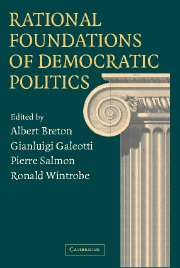Book contents
- Frontmatter
- Contents
- List of Contributors
- 1 Introduction
- PART ONE SOME PROBLEMS WITH DEMOCRATIC INSTITUTIONS AND TRENDS IN THEIR EVOLUTION
- 2 Demobilized and Demoralized: Negative Ads and Loosening Bonds
- 3 Turning “Citizens” into “Consumers”: Economic Growth and the Level of Public Discourse
- 4 Economic and Cultural Prerequisites for Democracy
- 5 Civil Society and the Contemporary Social Order
- PART TWO MORALS IN POLITICS
- PART THREE SOCIAL CAPITAL
- PART FOUR THE ROLE OF CONSTITUTIONS
- Index
- References
4 - Economic and Cultural Prerequisites for Democracy
Published online by Cambridge University Press: 28 July 2009
- Frontmatter
- Contents
- List of Contributors
- 1 Introduction
- PART ONE SOME PROBLEMS WITH DEMOCRATIC INSTITUTIONS AND TRENDS IN THEIR EVOLUTION
- 2 Demobilized and Demoralized: Negative Ads and Loosening Bonds
- 3 Turning “Citizens” into “Consumers”: Economic Growth and the Level of Public Discourse
- 4 Economic and Cultural Prerequisites for Democracy
- 5 Civil Society and the Contemporary Social Order
- PART TWO MORALS IN POLITICS
- PART THREE SOCIAL CAPITAL
- PART FOUR THE ROLE OF CONSTITUTIONS
- Index
- References
Summary
Just as the regimen of the healthy is not suited to the sick, one must not try to govern a corrupt people by the same Laws as those that suit a good people. Nothing proves these maxims better than the long life of the Republic of Venice, which still retains a simulacrum of existence, solely because its laws are suited only to wicked men.
Rousseau (1997/1755, p. 135).INTRODUCTION: IMPLICIT ASSUMPTIONS IN DEMOCRATIC ANALYSIS
Modern scholars may disagree about the merits of alternative forms of democracy, but generally agree that democracy is self-sustaining in the sense that once in place it continues uninterrupted. Donald Wittman's (1995) book, The Myth of Democratic Failure, makes this presumption explicit with its title, but essentially all rational-choice-based analyses of democracy use this assumption as an uncontroversial point of departure. That is to say, modern analysis of democracy generally presumes that democratic governance is always a feasible method of making policy decisions. The question addressed in this chapter is whether this presumption is defensible. Are there implicit assumptions about the cultural or economic environment that are implicitly being made when the feasibility of democracy is taken for granted?
To get some sense of the problem that I am interested in here, recall the optimistic forecasts that were widely made by economists in the early 1990s as the Iron Curtain disappeared overnight. Economists evidently believed their models, which seemed to imply that a market only requires unimpeded trade to achieve competitive results.
- Type
- Chapter
- Information
- Rational Foundations of Democratic Politics , pp. 44 - 67Publisher: Cambridge University PressPrint publication year: 2003
References
- 7
- Cited by



